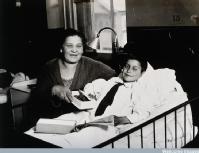Seminar 5: Child health, Emotion and Responsibility: The Cases of Hospital Visiting and MMR
 |
This week we will explore two case studies, the campaign to allow parents access to their hospitalised children and the 1998 health scare surrounding MMR and its relationship to autism and other disorders. We will continue to consider changing ideas of who is responsible for the health and care of children: parents, the state, the medical profession or institutions. We also examine the impact of advice literature more broadly, as well as changing ideas of children’s emotional status and the ‘psychologisation’ of childhood. As part of seminar preparation, I will give you some leads to carry out your own research into the 1998 scare around MMR vaccine and autism. |
1. What arguments were used to support unrestricted visiting to children in hospital and why were these resisted?
2. Who was deemed responsible for the health of children in the twentieth century, and how do you think this changed over time?
3. Why did Dr Andrew Wakefield’s claims about the MMR jab have such a major impact?
Seminar Reading:
Harry Hendrick, ‘Children’s Emotional Well-being and Mental Health in Early Post-Second World War Britain: The Case of Unrestricted Hospital Visiting’, in Marijke Gijswijt-Hofstra and Hilary Marland (eds), Cultures of Child Health in Britain and the Netherlands in the Twentieth Century (London and New York: Rodopi, 2003), 213-42. scanned article
Angela Davis, Modern Motherhood: Women and Family in England, 1945-2000 (Manchester and New York, Manchester University Press, 2012), ch. 5. e-book
Siân Pooley, ‘“All we parents want is that our children’s health and lives should be regarded”: Child Health and Parental Concern in England, c.1860–1910’, Social History of Medicine, 23 (2010), 528-48. e-resource Oxford journals
Primary Sources
For this week, please bring along a piece of primary source material from the medical press (see Lancet, BMJ etc.), newspapers (history resources via the main library website), YouTube or the internet relating to the 1998 health scare surrounding the MMR jab and its relationship to autism. Each person will be asked to share an overview of the source in the seminar.
Additional Reading:
Daniel Beekman, The Mechanical Baby: A Popular History of the Theory and Practice of Child Raising (London: Dobson, 1977).
Lucinda McCray Beier, For Their Own Good: The Transformation of English Working-Class Health Culture, 1880–1970 (Columbus, Ohio: Ohio State University Press, 2008), chapter 4 ‘“No fever in our house”: Contagion, Prevention, and the Working Class’. scanned article
Linda Bryder, ‘“Wonderworlds of Buttercup, Clover and Daisies”: Tuberculosis and the Open-Air School Movement in Britain, 1907-39’, in Roger Cooter (ed.), In the Name of the Child: Health and Welfare, 1880-1940 (London: Routledge, 1992), 72-95.
Ann Clark, ‘Compliance with Infant Smallpox Vaccination Legislation in Nineteenth-Century Rural England: Hollingbourne, 1876–88’, Social History of Medicine, 17 (2004), 175-98. e-resource Oxford journals
Marguerite Dupree, ‘Family Care and Hospital Care: The “Sick Poor” in Nineteenth-Century Glasgow’, Social History of Medicine, 6 (1993), 195-211. e-resource Oxford journals
Nadia Durbach, ‘“They Might As Well Brand Us”: Working-Class Resistance to Compulsory Vaccination in Victorian England’, Social History of Medicine, 13 (2000), 45-63. e-resource Oxford journals
William Graebner, ‘The Unstable World of Benjamin Spock: Social Engineering in a Democratic Culture, 1917-1950’, The Journal of American History, 67 (1980), 612-29. e-resource JSTOR
Anne Hardy, The Epidemic Streets: Infectious Disease and the Rise of Preventive Medicine 1856-1900 (Oxford: Clarendon Press, 1993), esp. chs 2, 3. e-book
Christina Hardyment, Perfect Parents: Baby-Care Advice, Past and Present (Oxford: Oxford University Press, 1985).
Harry Hendrick, Child Welfare: Historical Dimensions, Contemporary Debate (Bristol: The Policy Press, 2003).
Elizabeth Lomax, Small and Special: The Development of Hospitals for Children in Victorian Britain (London: Wellcome Institute for the History of Medicine, 1996).
Denise Riley, War in the Nursery: Theories of Child and Mother (London: Virago, 1983).
John Stewart, “I Thought You Would Want to Come and See His Home”: Child Guidance and Psychiatric Social Work in Inter-War Britain’, in Mark Jackson (ed.), Health and the Modern Home (London and New York: Routledge, 2007), 111-27. e-book
Deborah Thom, ‘Wishes, Anxieties, Play, and Gestures: Child Guidance in Inter-War England’, in Roger Cooter (ed.), In the Name of the Child: Health and Welfare, 1880-1940 (London: Routledge, 1992), 200-19.
Mathew Thomson, Psychological Subjects: Identity, Culture, and Health in Twentieth-Century Britain (Oxford: Oxford University Press, 2006).
Cathy Urwin and Elaine Sharland, ‘From Bodies to Minds in Childcare Literature: Advice to Parents in Inter-War Britain’, in Roger Cooter (ed.), In the Name of the Child: Health and Welfare, 1880-1940 (London: Routledge, 1992), 174-99.
Essay Questions
Who was deemed responsible for the health of children in the twentieth century, and how do you think this changed over time?
Why and in what ways has vaccination been a source of conflict between individuals and the state since the nineteenth century?
Explain the emergence of a focus on children's emotional well-being in twentieth-century medicine.
